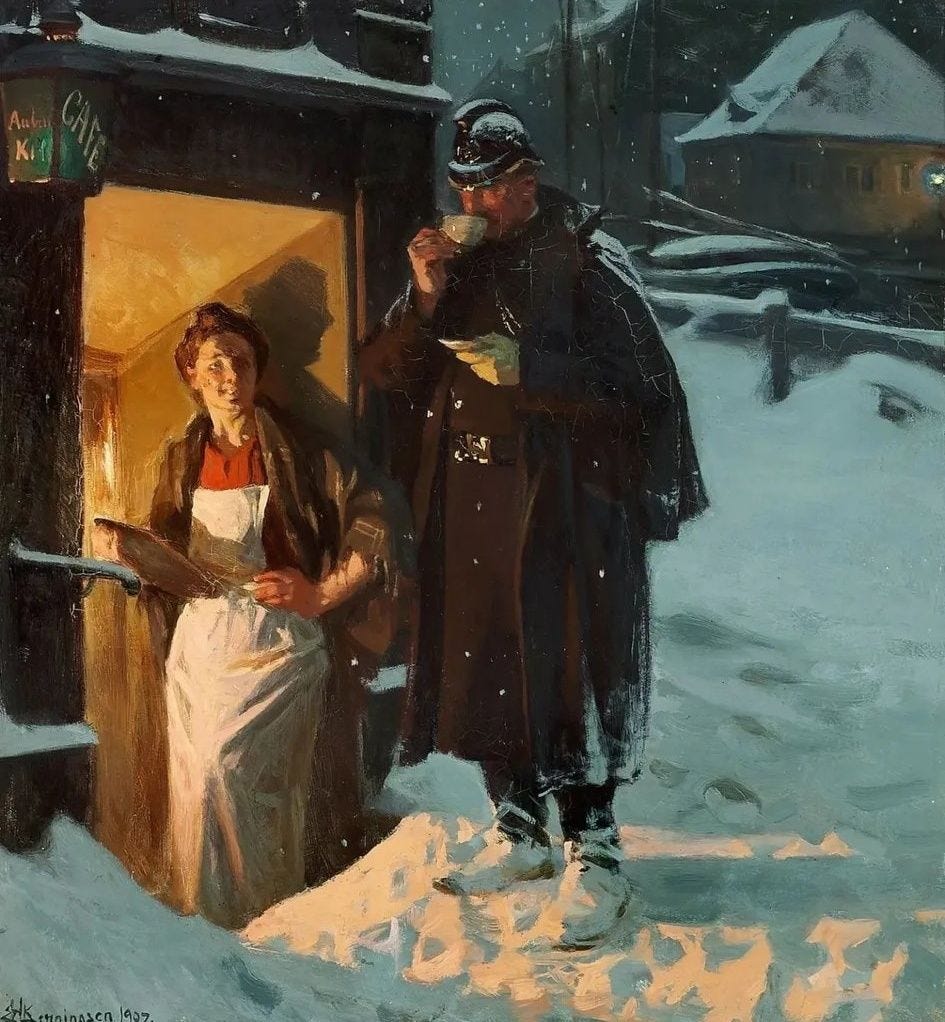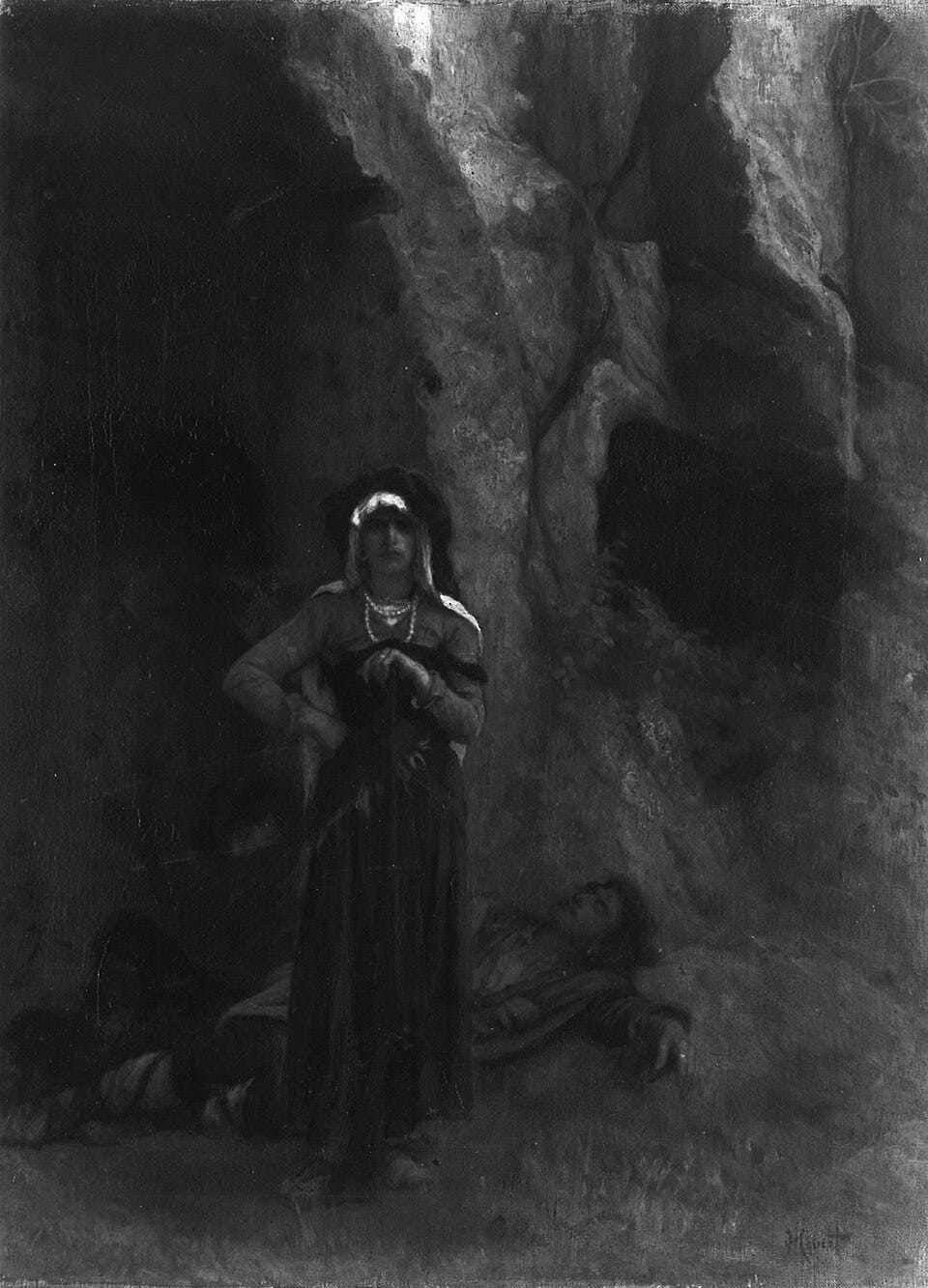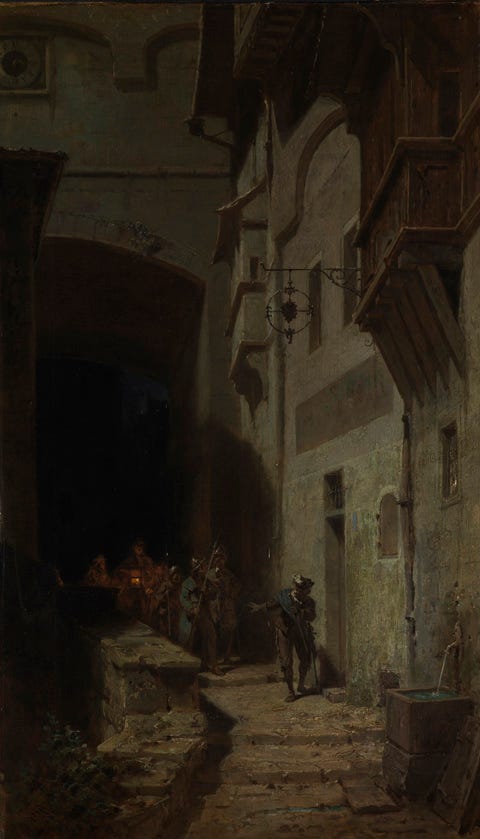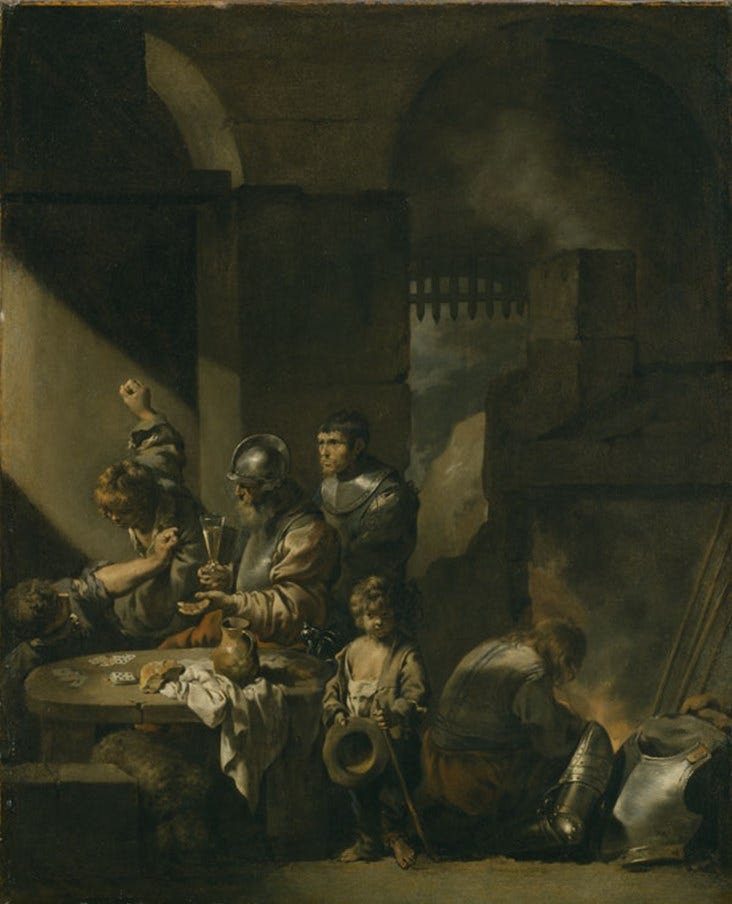On Guard
'Time is the Enemy'
I am doing proper work, but all for things I cannot show. Here is a very basic concept for a kind of quiet, still, ‘para-venture’ made up of quiet, strange moments; only things which happen in the night.
The PCs are hired as the Night Watch for the rear entrance of a Magical Academy. Their shift runs from sunset to sunrise and their only job is to guard a particular door, manage entry, and, if there are more than three PCs, patrol the perimeter.
Concepts
Stay In Place
The PC’s cannot move. They do not go anywhere. They have to stay by the door, stay alert and stay On Guard. In case of a serious emergency, they could perhaps, walk down the alleyways behind the college, to investigate a fire, a dying man, a crashed cart or the like, but they better be back On Guard fast. But there won’t be a ‘Serious Emergency’.
No Drama
Almost nothing dramatic happens. There are dramas, conspiracies and crimes happening in the College, in the city, in the night, but the PCs are simply ‘extras’ in these plots and happenings. A man runs down the alleyway, veers into a side-street. Then a second man, perhaps a Hero or Detective, runs the same way; “Did you see where he went?” The PCs can answer however they like. This will be the limit of their interaction. They do make some decisions, which will have some effect, but they are not the main event
Long Term Awareness
A long time is meant to pass. Certainly months, perhaps a few years. The PCs have to save up money (and not get fired). One effect of this is the depth and detail revealed by the ever increasing familiarity the PC’s have with their small patch of space.
This area, around the rear wall and the rear door, its locality, everything near it and everything they can see, hear and smell, everything they experience in this place, they perceive with incredible depth. The details of the alley itself, its shifts and changes over seasons. Its stones and flags. Details of the view - like 'Rear Window' they see the same view every night and grow accustomed to its patterns, so much that when they change (the wrong light going on at the wrong time, a dog that doesn't bark in the night), they notice. Details of the soundscape - they hear the city round them, night after night, and know its rhythms and patterns, from market nights (lots of rats from the lost produce), post-festivals (vomit and people passed out), the regular closing times of pubs nearby, the brawls and drama they hear on Saturdays, religious holidays and the timing of bells and sacred services, through months and seasons, all of this becomes deeply familiar to them, so much that if the pattern changes, they notice. And minor things; the fortunes of a stray cat (regular visitor), corrosion of the brickwork, (“somebody needs to have a look at that”), a broken drain, a banging gate a mile away.
Minor Situations
The PCs have a list of people who are allowed to go in and out, and are definitely meant to keep a list of anyone who does.
What if someone 'very important seeming' turns up, but they aren't on the list, but they say its ok? If the PCs don’t let them in, they could get into trouble, but if they do let them in, they could get into trouble for that. What if this sets a pattern and someone starts taking advantage? What if they offer a distaff bribe? What about horny students climbing the walls? What about the woman you see in her window? The noises from the sewer? The sound of a thief fleeing in the darkness a street away?
What Kind of Characters?
The players could make PCs specifically for ‘On Guard’, but if incorporated into a wider campaign the ‘Player Characters’ of ‘On Guard’ could be;
· Old; PCs who have simply aged out of adventuring, but who are not so rich they can fully retire.
· Injured; PCs who received a substantial injury it will take time to heal. This could have permanently altered their employment prospects (‘Took an arrow to the Knee’) or they may simply need some time in a less-stressful position.
· Mentally Traumatised; or even cursed.
· Young; those who have not yet started their adventuring career, (and if they stay in this job, perhaps they never will).
· Under Cover/On The Lam; the Adventurers are hiding for some reason and have taken on false identities. Either as part of a larger scheme or simply to avoid the Law until the heat dies down.
If the PCs are still adventurers, they should have no particular scheme or idea in play regarding the College of Magic, or any nearby organisations. This would ruin the character of ‘On Guard’, which is meant, fundamentally, to be ‘about nothing’ or about what happens between and within people who are ‘doing nothing’.
The Rules of the Job
You stay On Guard from Sunset to Sunrise. This means in Summer, hours are short, but the work is easy as its warm. While in Winter, hours are LONG, and the work is hard, (but at least you get paid more).
You take over from the Late Shift, who are supposed to maintain the gate, the record and the Watch House, (but often don’t), and you hand over to the Morning Shift (who are often late).
There is a Gate, a smaller man-sized Gate within that gate, a Watch House within the walls (one room), and a Rear Perimeter (you are not meant to patrol the front of the building – it has, or is meant to have, magical defences and a small guard staff who are much better paid and uniformed than you. You would make the College look bad to be seen ‘out front’.
Duties
You have three duties, depending on how many players there are.
· First and most important; two Guards (in Uniform, with halberds (this is non-negotiable)), must always be ‘On Guard’ before the Rear Gate.
· If there are two more, they should patrol the rear of the College, slowly, quietly, roughly once an hour.
· If there are two more, making six, then two can sit in the Guard House. Its one room with no fire, (but you are allowed a brazier outside in winter).
· There is a ‘behavioural code’ meaning no ‘slovenly or disruptive’ behaviour, including no ‘leaning’, no ‘leaning of Halberds’, no smoking, drinking, fraternising, game or chatter. No pets – has been recently added.
· There will be surprise inspections and regular checking of paperwork.
General Equipment
· Hourglass – this tells you which hour of the Watch you are in. (Though Church bells throughout the night will do this too.)
· Small Gate Keys - which you receive, (or are meant to receive) from the Late Watch, and which you in turn hand over to the Morn Watch. These open the small gate-within-the-gate, not the large one.
· Entry List - particular names who are allowed in or out of the Rear Gate. In some cases these names have descriptions, special seals they are meant to have, riddles or even stranger things. This also changes for mysterious reasons. You are pretty sure the Late Shift have added some things on there as a joke.
· Passage Log - the names of everyone who did come in or out. You are meant to record all of these, along with the time, any pertinent details etc.
· Watch Log - where you report.. well anything that happens.
· Equipage Log – where you sign in and out confirming that you have received all this stuff. (Oddly, the Equipage Log itself is not noted in the Equipage Log.
· Ink and Pen – this freezes in winter, dries in summer and the Late Watch always use it up and don’t replace it.
· Three Lanterns and enough oil for two Lanterns for Eight hours. (One is meant to be spare and they do not adjust for Winter or Summer hours.)
· Brass Whistle – this indicates the Watch Commander, (a near meaningless rank).
· Bell – to be rung only in event of attack on the school, but if an attack is underway, it must be rung.
· Lot Tin – for choosing who goes on Watch/Patrol/Reserve with who. The ‘Watch Commander’ can decide this, but the College recommends you take lots for it, to avoid cliques forming.
Personal Equipment
· Morion Helm – Non optional. shared with the other Watches. Most Guards wear a coif of some kind which they own themselves.
· Chainmail – shared, has to be adjusted for each guard. (You are allowed to bring your own armour).
· Halberd – shared and non-optional. A Guard ‘On Guard’ or ‘On Patrol’ must have their halberd with them and specifically in their hands at all times. (This is impossible while also writing down names). The Halberd does have a hook-thing on it you can hang a lantern from. The Halberds are very top-heavy and uncomfortable to carry.
· Tabard – with the Symbol of the College. Again, non-optional.
There is also a general dress-code indicating you should be reasonably turned out, facial hair trimmed, clean and ‘give a good account of yourself’. Added is ‘No slender knives, incendiary devices or knuckledusters’. You are not specifically banned from smoking, though without an ‘incendiary device’, how can you light anything?
Kinds Of Schedule
The substance of the game is made up of layered patterns of time. Rhythms of events sensed by the PCs, layered over and upon each other, each subtle changing according to circumstance of the time of the year.
Remember the deeper one gets into night, and the quieter everything becomes, the more sounds seem to carry. Sounds usually inaudible become more tangible. A single iron-wheeled cart several streets away is virtually inaudible in day, very striking after midnight.
The life of the City
· Last bars putting out, (these may have different characters).
· The last carriages leaving, wheels striking the cobblestones.
· Bells ringing.
· A dog that always barks when its master comes home.
· Garbage men making their rounds,
· Sewermen and Gongfarmers.
· Bakers arriving for work and their bakeries lighting up.
· The sound of single horses hooves moving at midnight.
· Traffic, the tramping of feet, of horses and cattle, dying away around sunset and building again before dawn.
· A dawn chorus when the sun rises.
Animal Life
· Stray cats.
· Stray dogs (rare).
· Rats in the street (where are they going to or from?).
· The occasional owl at night .
· Urban foxes.
· Lost stray or rare domestic animals, a lost pet from somewhere (maybe in the college, an escaped test subject)
· A run-away horse or donkey several streets away.
Plant Life
This changes more than anything season to season. Everything tangible to the PCs is very small, stuff people passing by likely wouldn't notice.
· Flowers growing in the wall.
· Weeds in the gaps in the paving stones out back.
· A small tree starts sprouting - pull it out?
· Things growing in the gutters of the buildings up above.
Slow-time senses
the things you would only notice if you were in a single place, listening and watching,for a long time, time after time.
The wind turning the weathervanes. Shifts in the winds sound as it moves its direction; from some angles it is displaced over the roofs, from others, funnelled by the streets and whooshes down your alleyway
The pulse of water running through drains in the minutes after a sudden shower. Anywhere dripping water lands just-so on a resonant surface, making a lout repetitive sound.
Any door or gate, within half a mile that swings regularly in wind. Even if the noise is slight, its rhythmic irregularity makes it highly noticeable in the middle of the night.
In the darkness, the ground only visible from the sheen of lamplight on wet cobbles, or the little pools between them, making a gridwork of light, the trail of particular snails across cobbles or bricks. the general prevalence of snails and slugs at certain times. A hedgehog!
Sounds of the Academy
What is even going on in there? It’s a magical Academy right? - and a Hogwarts style thing, so there are going to be students sleeping overnight, presumably broken up by house and gender, so you may have some Harry Potter little shit, or groups of little shits, running around in the night on some 'adventure'.
Overnight Experiments – it’s a research school as well, magical research I would think, so with some alchemical or ritual magics, you are going to need to be going all night, possibly over several days, and so have people attending to the 'reaction' or the 'summoning' all night.
Plus MIDNIGHT is always a magical time, so every night at midnight there is maybe going to be some chanting and/or some lighting or electricity going on.
Most astronomers would likely have to leave the city to observe, but you would see them leaving and coming back in the dawn.
Wizards making magical doors in the wall.
A well-known 'climbing spot' where students can get over the wall and go about in the city acting tough, thinking they are cool, and you can possibly get bribed by them
I probably need to do a whole section on bribery.
Possible monsters/vampires/doppelgangers trying to get in/out, like a guy who is clearly a pale jelly-like simulation of someone else, so you just don't let him in. (This would conflict with the ‘no drama’ rule.
How do you actually 'play' this game?
The actually-difficult part. There is a reason, after all, that no-one designs games like this. Ultimately this is not a thing where challenge is going to be a huge part of the game, people are largely going to be there because they want to be, but it still needs to be some part of the game. So far I have no actual plan, but only concepts….
Time is the Enemy
If Time really is the enemy, then any challenge of this adventure lies not necessarily in facing any particular event but in simply getting through the night. A failure state means what exactly? You get bored, fuck up, get your pay docked, get fired?
Don’t Be Noticed
A useful concept might be that at least one member of the crew is genuinely ‘hidden’, maybe an ex-criminal or in hiding from some other organisation, and they really don’t want anything to happen. In that sense, ‘getting through the night’, like getting through a bunch of nights, without being fired or reprimanded, but also without being noticed or remarked on, adds more of a gamic element.
Its tempting to make it so that every member of the crew has some particular reason for not being noticed, or a particular desire specifically for nothing exciting to happen. Making them all explicitly, or secretly anti-adventurers. But that alone makes this perhaps more of ‘game’ than I originally conceived it as being. (Though much more tangible to a wider audience.)
Near Real-Time
Concept – the game at its basic level is lived almost in ‘real time’. You simply live through the 'hours'. Most of the ‘action’ of the game is trying to find things to do that will ‘speed up’ time, while also not actually making you bad at your job or getting you into shit.
Betting Time
One concept is some kind of 'betting system' where the PCs can 'bet' time, but the more time they 'bet' the more likely they are to be inspected or to get something wrong somehow, thus throwing them back into ‘real time’, and/or giving them some kind of negative event.
Ways to ‘Accelerate’ Time
Perhaps you can accelerate time by telling each other stories, playing games of chess, (presumably inside the guard room), having random conversations etc. Maybe this could take advantage of the slightly sopophoric sleepy regular intonation of events – if PCs can have random conversations about the sound of a bell, or a dog barking, that’s fifteen minutes or half an hour taken off. This would be defeating time through role play.
A Boredom Score
Maybe the pcs have to roll (collectively) against boredom? Or to roll awareness, and if they succeed, they get a richer, more detailed story of the events of the watch, while if they fail, they get the bare information.
We can do this hour-by-hour with each hour being a separate roll, and with environmental effects and the various preparations for them also affecting this. Like - you are not meant to have a chair out here, or to lean against the wall, (a brazier is allowed in winter), but you can kind of fudge this by keeping a secret chair, or by covertly leaning against the wall, or leaning your Halberd against it, maybe this brings down your Boredom Score, or makes time faster, but with some secondary negative effect, getting caught or being punished some other way.
‘Islands’ of Events
The big problem with this information is that its NON INTERACTIVE (or much of it is). Maybe I could break the 'watch' up into 'islands' of minor interactable events, like a cat visits, someone throws up on the street, a visitor comes to the rear door, and simply have long chants of information between each 'event'.
……………………………………………….
Well, ‘design’ questions like this are part of the reason comment threads exist.









This makes me think of collaborative story games I've played, without a GM.
Here, I can see players pitching things that happen — but perhaps having to roll, or negotiate, or be punished (interact with some mechanic, anyway) for things that are too interesting, or exciting, or too far away from the PCs' designated space. Failed pitches could be waved away as daydreams, the guards imagining something more interesting than their (imaginary) lives. There are stories to tell both about the PCs (who might have home lives and other obligations and stressors they bring to work but can't do anything about), and in the world around them — though if those external stories became too clear or resolved or answered for, that's probably too interesting.
I am fascinated by this kind of slow play. I saw a similarish idea a bit ago in which a redditor said they ran an ars magica game, but the PCs are non-magical farmers, trying to get by in a world in which the nearby wizarding academy turns their pumpkins into carriages and leaves bits of arcane paraphernalia among the peas. Perhaps incidental stuff to the wizards, but mind bending and maybe even life changing to the farmer.
This, of course, is far more subtle, but I read in your description an impression of adventure and intrigue just beyond the limit of the guard’s sight, and a tension between investigating the call to adventure and fulfilling their responsibilities as a guard. Love it.